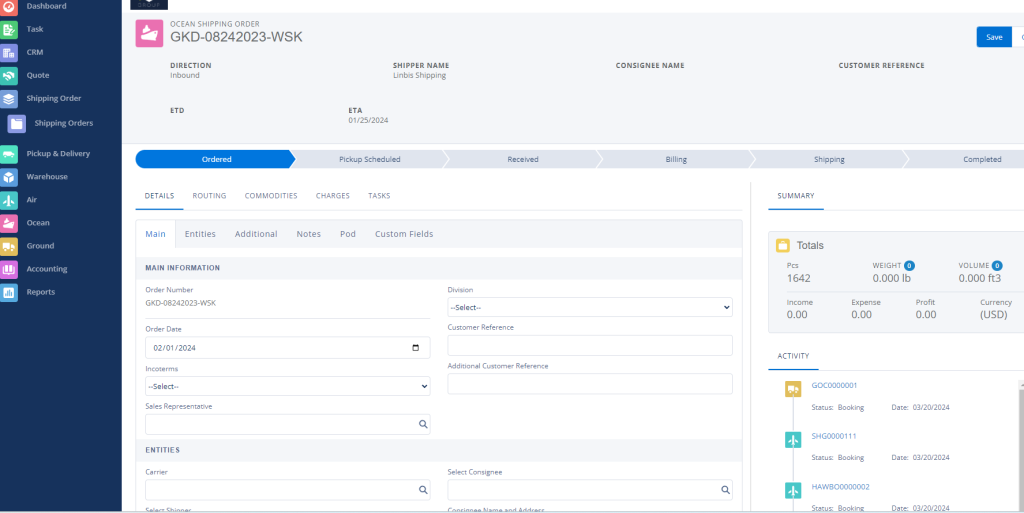E-commerce Warehouse Management Systems for Efficiency

Overview of E-commerce Warehouse Management
E-commerce businesses face unique challenges, including handling returns, managing large product assortments, and meeting customer expectations for quick delivery.
The right WMS can streamline e-commerce operations, enhance order accuracy, reduce fulfillment times, and improve customer satisfaction. By integrating advanced technologies and best practices, businesses can optimize their warehouse management and stay competitive in the fast-paced e-commerce market.
Best WMS for E-commerce Businesses
Selecting the best WMS for e-commerce businesses involves considering specific features and functionalities that cater to online retail operations. Here are some key features to look for in a WMS for e-commerce:
1. Real-Time Inventory Tracking
A robust WMS should provide real-time visibility into inventory levels across multiple locations. This ensures that stock levels are accurate, preventing overselling and stockouts. Real-time tracking also enables better inventory planning and forecasting.
2. Order Management
Efficient order management capabilities are essential for processing high volumes of orders quickly and accurately. The WMS should support batch picking, wave picking, and automated order routing to streamline the fulfillment process.
3. Integration with E-commerce Platforms
The WMS should seamlessly integrate with popular e-commerce platforms such as Shopify, Amazon, eBay, and Magento. Integration ensures smooth data flow between the WMS and the online store, enhancing order processing and inventory management.
4. Returns Management
Handling returns efficiently is crucial for e-commerce businesses. The WMS should include features for processing returns, updating inventory levels, and managing reverse logistics. This helps in maintaining accurate stock levels and improving customer satisfaction.
5. Scalability
As e-commerce businesses grow, their warehouse management needs may change. The WMS should be scalable to accommodate increasing order volumes, new sales channels, and expanding product lines. This ensures that the system can grow with the business.

Solutions for Efficient E-commerce Warehousing
Implementing efficient e-commerce warehousing solutions involves leveraging advanced technologies and best practices to optimize operations. Here are some key solutions for efficient e-commerce warehousing:
1. Automated Picking Systems
Automated picking systems, such as pick-to-light, voice picking, and robotic picking, enhance picking accuracy and speed. These systems guide warehouse workers to the correct items, reducing errors and increasing efficiency.
2. Warehouse Automation
Warehouse automation solutions, such as automated storage and retrieval systems (AS/RS) and conveyor systems, streamline material handling and reduce manual labor. Automation enhances throughput and minimizes the risk of errors.
3. Cross-Docking
Cross-docking involves transferring incoming goods directly to outbound shipments with minimal storage time. This reduces handling and storage costs, speeds up order fulfillment, and minimizes the need for large storage areas.
4. Data Analytics
Data analytics tools provide insights into warehouse operations, helping businesses identify inefficiencies and optimize processes. Analyzing data on order patterns, inventory turnover, and picking performance can lead to data-driven decisions that improve efficiency.
5. Mobile Solutions
Mobile solutions enable warehouse staff to access real-time data and perform tasks on the go. Mobile devices equipped with barcode scanners and WMS applications improve inventory accuracy, speed up order processing, and enhance overall productivity.

Managing E-commerce Logistics
Effective e-commerce logistics management involves coordinating various activities to ensure timely and accurate order fulfillment. Here are some key aspects of managing e-commerce logistics software for small business:
1. Shipping and Delivery
Offering fast and reliable shipping options is crucial for meeting customer expectations. Partnering with multiple carriers and using a Transportation Management System (TMS) can optimize shipping routes, reduce costs, and ensure timely deliveries.
2. Inventory Optimization
Maintaining optimal ecommerce inventory levels across multiple locations is essential for meeting customer demand without overstocking. Techniques such as demand forecasting, safety stock management, and inventory optimization models help in achieving the right balance.
3. Returns Management
Efficient returns management is critical for maintaining customer satisfaction and operational efficiency. Implementing a streamlined returns process, including automated return authorizations and reverse logistics, ensures quick and accurate handling of returns.
4. Warehouse Layout
Designing an efficient warehouse layout reduces travel time and enhances workflow. Grouping high-demand items closer to packing stations, using vertical storage solutions, and ensuring clear pathways can improve overall efficiency.
5. Customer Communication
Keeping customers informed about their orders is essential for enhancing the customer experience. Providing real-time order status updates, shipment tracking, and clear communication on returns and refunds builds trust and loyalty.
Top WMS Solutions for E-commerce

Several top WMS solutions cater specifically to the needs of e-commerce businesses. Here are some of the leading WMS solutions for e-commerce for Big business and for small warehouses.
1. Linbis
Linbis Logistics Software offers a comprehensive e-commerce WMS that provides real-time inventory tracking, advanced order management, and seamless integration with popular e-commerce platforms. Linbis WMS is scalable and customizable, making it suitable for businesses of all sizes. Linbis warehouse management software for small business offer a full list of features for you logistics operation.
2. NetSuite WMS
NetSuite WMS offers robust features for e-commerce businesses, including real-time inventory visibility, order management, and returns handling. It integrates seamlessly with NetSuite’s ERP and e-commerce solutions, providing a unified platform for managing operations.
3. Fishbowl
Fishbowl is a versatile WMS that supports e-commerce businesses with features such as inventory management, order processing, and integration with popular e-commerce platforms. Fishbowl’s scalability makes it ideal for growing e-commerce businesses.
4. ShipBob
ShipBob is a fulfillment service that offers an integrated WMS for e-commerce businesses. It provides real-time inventory tracking, automated order processing, and multiple shipping options, ensuring fast and reliable order fulfillment.
5. Cin7
Cin7 offers a cloud-based WMS designed for e-commerce businesses. It provides real-time inventory tracking, order management, and integration with various e-commerce platforms. Cin7’s flexibility and scalability make it suitable for businesses of all sizes.
How Linbis Helps Companies with E-commerce WMS
Linbis offers comprehensive e-commerce WMS solutions designed to optimize warehouse operations and improve efficiency. Here’s how Linbis can support your e-commerce WMS needs:
Advanced Warehouse Management System (WMS)
Linbis provides a state-of-the-art e-commerce WMS that offers comprehensive tools for inventory tracking, order processing, and returns management. Our WMS integrates seamlessly with popular e-commerce platforms, streamlining workflows and enhancing accuracy.
Real-Time Data and Analytics
Our analytics tools provide real-time insights into warehouse operations, helping managers make informed decisions. Linbis offers advanced analytics and reporting tools that track key performance indicators (KPIs) and provide actionable insights for continuous improvement.
Scalability and Flexibility
Linbis e-commerce WMS is highly scalable, allowing businesses to easily adjust their warehouse operations based on demand. Our solution is flexible and customizable, ensuring it meets the specific needs of your business.
Seamless Integration
Linbis e-commerce WMS integrates seamlessly with other business systems, such as ERP, CRM, and TMS. This integration ensures a smooth flow of information across different departments and enhances overall efficiency.
Enhanced Security
Linbis provides advanced security features to protect your data. Our e-commerce WMS benefits from encryption, multi-factor authentication, and regular security updates, ensuring that your warehouse data is secure.
Customer Support and Training
Linbis offers comprehensive training and support to ensure that your staff can effectively use our e-commerce WMS. Our training programs cover best practices, system functionalities, and troubleshooting, helping your team maximize productivity and efficiency.
FAQ
What is an e-commerce warehouse management system (WMS)?
An e-commerce Warehouse Management System (WMS) is a software solution designed to manage and optimize warehouse operations for online retail businesses. It includes features such as inventory tracking, order management, and returns handling.
What are the benefits of using a WMS for e-commerce?
The benefits of using a WMS for e-commerce include real-time inventory visibility, efficient order processing, seamless integration with e-commerce platforms, improved accuracy, and faster order fulfillment. These advantages help businesses optimize their warehouse operations and enhance customer satisfaction.
How do I choose the best WMS for my e-commerce business?
When choosing a WMS for your e-commerce business, consider features such as real-time inventory tracking, order management, integration with e-commerce platforms, scalability, and returns management. Evaluate vendors based on their experience, reputation, and customer reviews.
How can I improve the efficiency of my e-commerce warehouse?
Improving the efficiency of an e-commerce warehouse involves implementing automated picking systems, leveraging warehouse automation, optimizing inventory levels, using data analytics, and designing an efficient warehouse layout. These solutions enhance productivity and reduce operational costs.
How can Linbis help with e-commerce warehouse management?
Linbis offers advanced e-commerce WMS solutions that provide real-time inventory tracking, efficient order processing, seamless integration with e-commerce platforms, advanced analytics, and enhanced security. Our solutions help businesses optimize their warehouse operations and improve efficiency.

Conclusion
E-commerce warehouse management systems (WMS) are essential for optimizing warehouse operations, improving order accuracy, and enhancing customer satisfaction. By implementing the right WMS and leveraging advanced technologies, e-commerce businesses can achieve greater efficiency and competitiveness.
Linbis offers comprehensive e-commerce WMS solutions designed to support your logistics needs. For more information on how Linbis can help streamline your e-commerce warehouse operations and improve efficiency, visit our E-commerce Warehouse Management Software page and explore our advanced solutions tailored to meet your business requirements.
